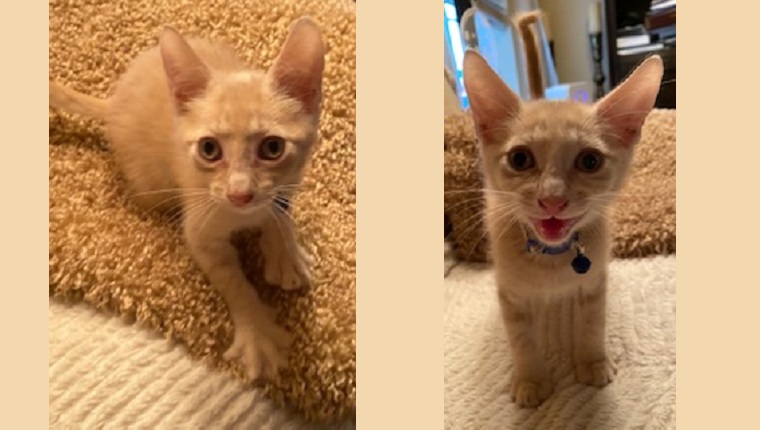The German Rex cat is a unique cat breed whose origins begin in the early 1930s in the historic German-Prussian medieval city of Königsberg, now part of Russia. As far as early records go, an ancestor of the German Rex-type cat was created from the cross between a Russian Blue and an Angora cat. As such crossbreeding goes, this cat was crossed with another breed, accidental or otherwise, likely a curly-coated cat. Ultimately, this beloved cat breed came to be in the years following World War II.
Regarding temperament, the German Rex is friendly and sociable. They often form strong bonds with their humans and are happiest when they can spend time with their families. They also have independent streaks and are okay with being left alone, although not for too long. This allergy-friendly (although not completely hypoallergenic) cat breed is also known for their soft and wavy fur and expressive eyes. They generally do not require much grooming, though their unique coat benefits from brushing to maintain its texture. These affectionate kitties are small to medium, weighing 6 to 11 pounds. The average life expectancy of a German Rex is 12 to 15 years.
When considering a German Rex, it’s advisable to prioritize adopting from rescue organizations or shelters to provide a loving home to a cat in need. However, if you decide to purchase a German Rex kitten, choosing a reputable breeder is crucial. Conduct thorough research to ensure that the breeder follows ethical practices and prioritizes the well-being of their cats. Reputable German Rex breeders prioritize the health and temperament of their cats, conduct necessary health screenings, and provide a nurturing environment for the kitties. This active approach ensures you bring home a healthy and happy kitty while discouraging unethical breeding practices.
German Rex Quick Facts
- Origin: Germany, developed in the 1930s from a mutation in a domestic shorthair cat.
- Size: Medium (8-12 pounds)
- Breed Group: Rex (short, curly coat)
- Lifespan: 12-15 years
- Coat: Short, dense, and curly, with various colors and patterns like solid, tabby, bicolor, and tortoiseshell. Feels like soft velvet to the touch.
- Temperament: Intelligent, playful, energetic, affectionate, social, curious, outgoing, enjoys attention and playtime.
- Exercise Needs: Moderate to high – playful, loves climbing, jumping, and exploring.
- Training: Easy to train, enjoys learning tricks and games.
- Grooming: Weekly brushing to remove loose curls and prevent matting.
- Health: Generally healthy, but some potential for genetic health conditions like hypertrophic cardiomyopathy (HCM).
- Laemmchen was the first known German Rex, which translates to “Poor Little Lamb” in German.
- The German Rex mutation gene is recessive.
-
Affectionate with Family
Some cat breeds are typically independent and aloof, even if they’ve been raised by the same person since kittenhood; others bond closely to one person and are indifferent to everyone else; and some shower the whole family with affection. Breed isn’t the only factor that goes into affection levels; cats who were raised inside a home with people around feel more comfortable with humans and bond more easily.

See Cats Less Affectionate with Family -
Amount of Shedding
If you’re going to share your home with a cat, you’ll need to deal with some level of cat hair on your clothes and in your house. However, shedding does vary among the breeds. If you’re a neatnik, you’ll need to either pick a low-shedding breed or relax your standards. This furniture cover can make it easier to clean up cat hair and keep it off your sofa!
-
General Health
Due to poor breeding practices, some breeds are prone to certain genetic health problems. This doesn’t mean that every cat of that breed will develop those diseases; it just means that they’re at an increased risk. If you’re looking only for purebred cats or kittens, it’s a good idea to find out which genetic illnesses are common to the breed you’re interested in.
-
Potential for Playfulness
Some cats are perpetual kittens—full of energy and mischief—while others are more serious and sedate. Although a playful kitten sounds endearing, consider how many games of chase the mouse-toy you want to play each day, and whether you have kids or other animals who can stand in as playmates. A classic wand cat toy like this one is perfect for playful felines!
-
Tendency to Vocalize
Some breeds sound off more often than others with meows, yowls, and chattering. When choosing a breed, think about how the cat vocalizes and how often. If constant “conversation” drives you crazy, consider a kitty less likely to chat.
-
Kid-Friendly
Being tolerant of children, sturdy enough to handle the heavy-handed pets and hugs they can dish out, and having a nonchalant attitude toward running, screaming youngsters are all traits that make a kid-friendly cat. Our ratings are generalizations, and they’re not a guarantee of how any breed or individual cat will behave; cats from any breed can be good with children based on their past experiences and personality.
-
Friendly Toward Strangers
Stranger-friendly cats will greet guests with a curious glance or a playful approach; others are shy or indifferent, perhaps even hiding under furniture or skedaddling to another room. However, no matter what the breed, a cat who was exposed to lots of different types, ages, sizes, and shapes of people as a kitten will respond better to strangers as an adult.
-
Easy to Groom
Some breeds require very little in the way of grooming; others require regular brushing to stay clean and healthy. Consider whether you have the time and patience for a cat who needs daily brushing. You should definitely pick up this awesome de-shedding tool for cats of any hair length!
-
Intelligence
Some cat breeds are reputed to be smarter than others. But all cats, if deprived the mental stimulation they need, will make their own busy work. Interactive cat toys are a good way to give a cat a brain workout and keep them out of mischief. This scratcher cat toy can keep your smart kitty busy even when you’re not home!
-
Pet Friendly
Friendliness toward other household animals and friendliness toward humans are two completely different things. Some cats are more likely than others to be accepting of other pets in the home.
German Rex Cat History
The German Rex has mysterious roots. Back in the 1940s, a cat with wavy hair was discovered living in the basement of a hospital in East Germany. She was named Laemmchen, and eventually her litters became the basis for the German Rex breed.
However, the German Rex cat is much rarer than the genetically similar Cornish Rex. The German Rex is officially recognized by the Fédération Internationale Féline. These days, you may find the German Rex breed in shelters or in the care of rescue groups. So, make sure to consider adoption if you decide that this is the cat for you!
German Rex Cat Size
The German Rex is a small- to medium-sized cat. As is always the case, exact size standards might vary. Most German Rex cats weigh in at five to eight pounds. Some cats can be smaller or larger than the average for their breed.
German Rex Cat Personality
In general, you can expect the German Rex to be a very active and very loving cat. You’ll definitely need to be willing to give your German Rex a lot of attention, whether that’s instigating play times or letting the cat come and snuggle up to you on the couch or in bed.
This cat will form a very strong bond with humans in their lives, and they also enjoy being picked up and handled. But it’s important to underscore that you’ll definitely need to be very involved in this breed’s life on a day to day basis. This is a smart feline that will happily learn to play fetch and will love solving problems to secure treats. If you’re away from the home for long periods of the day, the German Rex might not be the ideal cat breed for you. But if you can commit to lavishing your cat with attention, you’ll have a perfect feline companion.
German Rex Cat Health
German Rexes are generally considered healthy cats. As always, it’s important to schedule regular wellness visits with your cat’s vet. There aren’t any breed-specific health problems associated with the German Rex, but always look for signs that your cat might be in distress or pain.
German Rex Cat Care
As with all cats, it’s important to keep up your German Rex’s regular veterinary checkups to detect any health concerns early. Your vet can help you develop a care routine that will keep your cat healthy.
Beyond scheduling yearly wellness visits with your vet, make sure that you pick up a scratching post for your German Rex’s living environment. This can help promote healthy scratching and keep the cat’s nails in good condition. The German Rex is an active and athletic cat, so it’s imperative that their nails are kept in tip-top shape.
The breed’s ears should also be examined regularly for signs of dirt building up or possible infection. Talk to your vet about starting a regular teeth brushing regimen that will suit your German Rex. Your vet can advise you about specific brands and techniques.
German Rex Cat Coat Color And Grooming
The German Rex cat can be found in a wide range of colors, although versions based around black, white, chocolate, and fawn are common. The breed also comes in many patterns, including tabby, calico, smoke, and bicolor.
Regarding grooming, most German Rex cats are fine with weekly brushing sessions. This will help lessen the likelihood of hairballs and mats forming. Although as a breed with wavy hair, the German Rex often doesn’t naturally produce enough oil to maintain healthy skin and hair, so you’ll need to give the cat regular baths to prevent them from feeling greasy or suffering from skin irritations.
In terms of climate, the German Rex is generally an adaptable breed of cat, although they favor warmer temperatures. You should also always make sure that there’s enough shade and fresh water available during the hotter months.
Children And Other Pets
The German Rex is great with young kids. They’ll become best friends and instant play buddies. Just make sure that early socialization takes place, boundaries are properly set on both sides, and interactions between kids and cats are supervised.
When it comes to other household pets, the good-natured German Rex fares well with many domestic animals. But again, always supervise playtime between the new cat and existing pets, especially smaller ones who might be seen as prey by the cat. Ultimately, early socialization really pays off with this breed. Make sure to reward your German Rex for good behavior when you bring them home to your family!
German Rex Cat Rescue Groups
It may be hard to find a breed specific rescue for German Rex cats. However, you may want to try shelters and rescues that cater to all types of cats, including German Rex cats, as well as your local shelter. Here are some nonprofit rescues you can try:
More Info For You
If you’re also looking for a dog, check out DogTime’s dog breed page!





